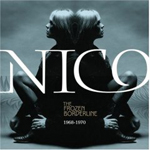|
|
 |
Dusted Reviews
Artist: Nico Album: The Frozen Borderline: 1968-1970 Label: Rhino Review date: Apr. 25, 2007 |

|
|
|
 |
“And what costume shall the poor girl wear to all tomorrow’s parties…”
Nico’s voice is one of the most instantly recognizable in all of rock - emotionally detached, slightly raspy, accented, world weary. Yet the majority of listeners only know that voice from the three songs that she sang on The Velvet Underground and Nico. With any luck, this UK-only release will help remedy that situation. It brings together Nico’s two best solo albums, The Marble Index and Desertshore, with outtakes, alternate takes and demo versions, each of which add greatly to the original albums, illuminating the creative process.
The Marble Index was a quantum leap up from the folk-pop of Nico’s debut, Chelsea Girls, two years before. It has an atmosphere unlike any album before or since, one that has - rather sensationally - been described as nightmarish or suicidal, but one that is definitely emotionally chilly. This is not music that draws you in or makes you feel good.
For a start, Nico wrote all the songs herself and they are highly distinctive – while initially rather featureless and detached, they become hypnotically engaging with repeated listening. Almost as important in creating the album’s characteristic mood is the inclusion of Nico’s harmonium. She made a strength out of her relative lack of expertise on the instrument. The resulting drones became the trademark sound of her music, a sound reminiscent of both mediaeval and Arabic music. The track “Frozen Warnings” (the compilation’s title is taken from its lyrics: “frozen warnings close to mine, close to the frozen borderline”) typifies the album in the purity of its melody and sound – although that purity comes at the price of emotion.
Once Nico’s harmonium and vocals were recorded, producer John Cale added a range of instruments – including viola, piano, bass, electric guitar, glockenspiel, mouth organ, all played by himself. Cale has only produced a select handful of albums, including these two plus Nico’s The End – together, the essential core of her solo work. Add the debut albums by The Stooges, The Modern Lovers and Patti Smith – Horses – and his status as a producer is unimpeachable.
However, on The Marble Index Cale the producer could have reined in Cale the musician; the alternate takes here are a revelation. They feature Nico’s voice with just harmonium, and the effect highlights the actual songs, increasing their impact; the original album versions sound cluttered by comparison. True, Cale’s instrumental contributions – particularly the addition of his viola – heighten the atmosphere, but sometimes they also risk overwhelming the vocals. This is obviously a matter of personal taste; long time admirers of The Marble Index may well find the alternate takes too sparse. The beauty of this compilation is that it provides both in full, allowing for choice and comparison.
Although recorded for a different label (Reprise, whereas The Marble Index was for Elektra), Desertshore is an ideal companion piece, having a similar mood and sound to its predecessor. It is the more engaging, less alienating record, as well as having greater uniformity. Cale was again producer (with Joe Boyd), using the same basic methodology as before, although his instrumental contributions are far less intrusive then before, complementing Nico’s voice and harmonium without unduly crowding them. “The Falconer” provides a perfect example; initially it features just voice and harmonium, but about halfway through Cale comes in on piano, playing a counter-melody that gives the track a lift just in time, making it sound fresher when it threatens to drag.
One could endlessly speculate about and analyze the lyrical content of Nico’s songs, but I shall limit myself to a couple of observations. It seems as if she often wrote as much for the sound of the words as for their meaning. That should not be taken to signify that the words have no meaning, just that their sound takes priority. For evidence, one need look no further than the opening track of Desertshore and one of Nico’s best known pieces, “Janitor of Lunacy,” which is peppered with apocalyptic lines that sound great but defy rational analysis (“Janitor of lunacy / paralyze my infancy / petrify the empty cradle / bring hope to them and me / Janitor of tyranny / testify my vanity / mortalize my memory / deceive the Devil’s deed”). They could refer to parenthood and maternal urges; Nico had an 8-year-old son, Ari, at the time, and he is featured briefly singing “Le Petit Chevalier,” initially charming but over time increasingly sinister. In addition, “Ari’s Song,” “My Only Child,” and “Mutterlein” all directly address the mother-child relationship, and are among the best songs here.
In her lifetime, Nico never received the credit she craved – and deserved – as a song writer and performer, with far more attention being focused on her beauty, her string of celebrity lovers, her drug addiction and its consequences. The two albums that comprise this compilation are undoubtedly the high-water marks of her solo career. If there is any justice, this release will familiarize more listeners with Nico’s work and garner her the credit she is due.
By John Eyles
|







